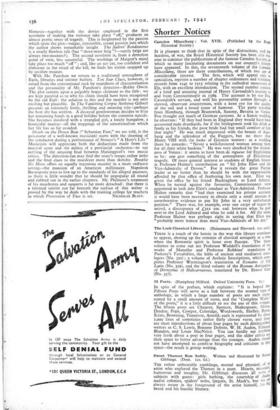Shorter Notices
IT is pleasant to think that in spite of the distractions, and the burdens, of war, the Royal Historical Society has been able this year to continue the publications of the famous Camden Society, in which so many fascinating documents on our country's history have appeared. In this, the seventeenth volume of the Camden Miscellany, there are three contributions, of which two are of considerable interest. The first, which will appeal only to specialists, reprints a number of chapter ordinances and visitation records from 1241 to 1515 relating to the cathedral monastery of Ely, with an excellent introduction. The second number consists of a brief and amusing journal of Henry Cavendish's journey to and from Constantinople in 1589. The account is by one Fox, Cavendish's servant, and well his personality comes through: a shrewd, observant countryman, with a keen eye for the quality of the soil and a broad sense of humour. The party travelled from Hamburg, through Brunswick, Saxony, Bavaria to Venice. Fox thought not much of German customs. At a Saxon wedding he observes : " If they had been in England they would have been accounted rude drunkards, for if the bridegroom took his drink as freely as his friends, the poor bride had but small comfort of him that night." He was much impressed with the beauty of Augs- burg and the splendour of the Fuggers, but no more than Henry VIII with the looks of German women : at a wedding there he remarks : " Never a well-favoured woman among them for all their white buskins." He was very shocked by the wicked- ness of Venice: it seems to have been de rigueur for Englishmen to be : one gets something of the atmosphere of Elizabethan tragedy. Of more general interest to students of English history is Professor Hulme's contribution on " Sir John Eliot and the Vice-Admiralty of Devon." For it reveals the great Puritan leader as no better than he should be with the opportunities afforded by that office of feathering his own nest. Eliot was given the office by his friend Buckingham as Lord Admiral. When he turned against the favourite, Commissioners were appointed to look into Eliot's conduct as Vice-Admiral. Professor Hulme remarks that " had they examined his private accounts it would have been necessary to obtain only a small amount of corroborative evidence to put Sir John in a very unfortunate position." There was, for example, over one cargo of sugars he seized, a discrepancy of £352 sos. sod. between what he pad over to the Lord Admiral and what he sold it for. All the same, Professor Hulme was perhaps right in saying that Eliot was " probably more honest than most Vice-Admirals of his day."






























 Previous page
Previous page